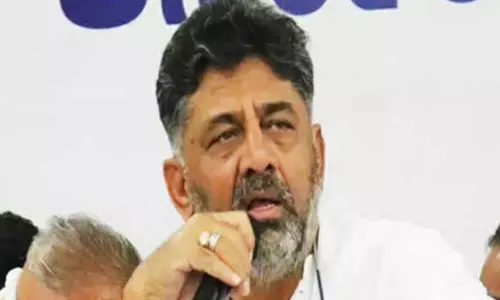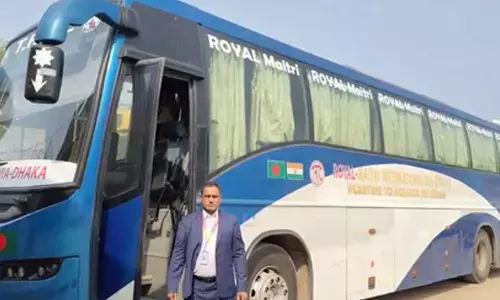In my morning walks on the Osmania University campus, I often cross many buildings allotted exclusively for some subjects and advanced specializations and the building for physical education draws my attention for special reasons. Similarly, in REC Warangal (NIT), the special interest being taken to make sports and physical education a compulsory part of all the first year and second year students’ routines impressed me.
Confined to four walls in concrete jungles with heaps of books , loads of tests and hardly any time to breathe in peace, leave alone relax and recreate oneself, the +2 education, with its race to secure a seat in prestigious institutions, leaves teenagers ‘mugging machines’ with no time and taste for physical activities.

To undo the damage, the REC is really taking a good step. I know that in their own way, if not like REC Warangal, all reputed institutes of higher learning do allot some funds and provide infrastructure for physical education in many forms to meet the norms set by accrediting and assessing authorities. But what I see around, what I read in the newspapers and what I feel in this regard is that we are doing too little, too late, at a very advanced stage while much ought to be done at an early stage, right from the grass roots level if we wish to derive benefit from it.
Very often, when at the time of participation in national and international events in sports and games or athletics, the medals tally glares us in the eye, we realize that we may be a nation with more than a billion members but we have not strengthened our youth , nor have we trained them adequately to be fit and competent to compete with fellow participants from fitness and sports conscious countries however small they may be demographically.
We are identified as a nation of cricket-lovers and we do see the sport getting the lion’s share in the media coverage too. My concern is to see how many schools in our country and in our State encourage any special sport. How many well trained and qualified coaches do we appoint? What kind of a talent pool have we identified and encouraged? We talk in theory of multiple intelligences and agree in concept that all individuals are unique, that intelligences differ from person to person, that it is unjust to assess all with a single yardstick, that it is the educators’ responsibility to identify and encourage the specific intelligence that could be dominant, be it logical, linguistic or kinesthetic.
We also assert that the skills acquired in one field can be transferred to other areas and applied in real life and that holistic education calls for a proper balance of physical, mental, emotional and spiritual progress. Then why are our school children deprived of the minimum time for vigorous physical activity? Why are a majority of our parents happy when the ‘study hours’ are increased even at the cost of cancelling the one games hour marked on the timetables? What kind of kinesthetic activity do we encourage when our lives are dictated by distorted preferences and value systems?
A look at the revised English textbooks introduced in our State is worth mentioning. In each class, they have included nice information about one sport, the biography of one or two extraordinary achievers and have directed children to do projects and tasks to know more about the benefits of such games and sports. I don’t find fault with the language activities, the content and the intention of using contemporary and relevant information for language teaching.
I regret that none of the schools, if I am not wrong, has any facilities to let children participate, experience and enjoy anything of what they read or hear. In future, there may be schools without hard copies of textbooks and classrooms without teachers, and we discuss what could be the negative impact of such scenarios, but right now we are doing the same with sports and games, talking, reading, listening and may be viewing but not doing! Is it not a pity? Are not our young ones’ childhood stunted?
What are sports supposed to teach? The list of values and experiences various writers have attributed to sports as the expected or desired effect of participation is long and miscellaneous.
The participant purportedly learns – or can learn – to : cooperate with teammates; display courage; play fair; be loyal to teammates; develop self-discipline and practice self-control; respect rules; express compassion; exhibit sportsmanship; maintain integrity; be honest and civil; become competitive; persevere; subordinate self to group; show leadership; feel empathy; understand ethics; develop perspective; reason at a more mature level morally; exercise critical thinking and feel self-esteem.
Many of these values seem to have been learnt naturally by the two young men I interviewed recently to check the validity of the above statement. Pullela Gopichand, the reputed badminton coach , had his parents’ and family members’ unflinching support when they realized that though he was quite good at academics, his heart was in badminton.
He practiced his beliefs that a player needed self-discipline, perseverance, focus through meditation, respect for rules and a keen analytical skill to improve on one’s mistakes. His straightforwardness, ability to inculcate true sportsmanship and reliability as a person of character have made him a much sought after coach by parents of aspirants of both genders.
So too Rishi, a class 11 student who represented our State in the under-14 category in cricket, has developed many good habits when his parents encouraged his interest.
His parents told me that he had learnt to manage his time, balance his academics and sports interests and developed the ability to analyze, discuss, communicate openly and freely even with strangers, realize the responsibility as a team player and accept both victory and defeat as a part of the game.
I felt that many 21st century skills for which we have been planning and dreaming can be inculcated in a pleasurable way if more and more children could be given similar openings. So far, it has been mostly the parental support alone that has brought out the talents in these young players, be it in tennis, chess, cricket or other games. Many parents do not dare to let their kids choose sports as a career as it is insecure.











